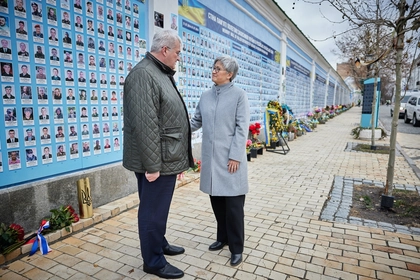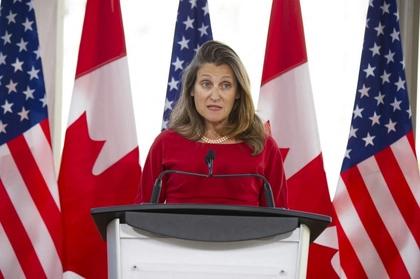Trump and his team are already trying to influence world politics with statements, phone calls and no doubt, other behind-the-scenes actions. Trump promised to end the war in Ukraine in 24 hours. Nobody will press the stopwatch until the day he takes office, but to have any hope of fulfilling his promise, he needs to “prepare” Putin and Zelensky for the end of the war in advance, so that on Jan. 21, the day after his inauguration, they are ready to sign an agreement to end the war.
Nobody on the planet can be oblivious to the fantastical nature of this plan, but Trump believes in himself with the force of one of Elon Musk’s rockets and we can assume that members of his team are already working to bring this miracle about. Some of them have no doubt called Putin’s people in the Kremlin with specific suggestions and advice on how to end Russia’s aggression and save face.
JOIN US ON TELEGRAM
Follow our coverage of the war on the @Kyivpost_official.
Rumors of a conversation between Trump and Putin may well be false, but there was almost certainly contact at some level. This “reaching out” from the US, may well have been what triggered a Russian smear campaign against the future US First Lady with the main TV propaganda channels broadcasting offensive reports featuring half-naked photos from her modeling days.
The recently renewed mass missile and drone attacks against Ukraine may have been in response to the hour-long phone call between Chancellor Scholz to Putin which certainly took place, but which has not yielded any advertised results. Perhaps someone from the Kremlin will eventually flee to the US and write a book about what was said. This is almost the only way the West ever received Kremlin insider-information during the Soviet era.

Australian Foreign Minister Visits Kyiv, Confirms Reopening of Embassy
Assuming no miracle occurs during the first 24 hours of Trump’s Presidency and Russia continues its aggression against Ukraine, the White House will have to start apportioning blame for the lack of peace.
The choice of culprits is limited: it is either Zelensky or Putin.
Accusing Putin of undermining the peace process would imply the need to impose additional sanctions against Russia and increased military aid to Ukraine. This would be at odds with the views of Musk who has become a key Trump adviser. In addition, Musk seems to have had a positive experience while communicating with Putin, so his role may be decisive. Putin may allow Musk to influence his decisions if he sees him as a key to influencing US policy in the future.
If Musk convinces Trump that the United States should avoid a deterioration in relations with Russia, then he will blame President Zelensky for undermining his peace initiative. That will be easy if Zelensky continues to refuse to consider territorial concessions, allowing Trump to throw up his hands and say: “I tried, but Zelensky is against the peace process.”
Ukraine's renunciation of its sovereignty over Crimea, the Donbas and southern Ukraine is the very least that Putin demands to end the ongoing Russian aggression. Trump may try to make it look like these concessions are his plan, but who will be fooled by that?
If Zelensky is “shown” to be the one who disrupted the peace process, the US can avoid having to make any difficult political or financial decisions. Indeed, it could allow the Washington to remove Ukraine from its political agenda altogether. Then Kyiv’s fate will depend on the European Union and other democratic countries which understand that this is a conflict between global authoritarianism and global democracy.
I recently travelled through Mukachevo, in Zakarpattia. That night, for the first time, missiles had landed in this preciously unscathed part of the country. The locals were angry and did not mince their words about Putin.
“How can he?” grumbled the lady server in the cafe. “He promised not to shoot at his friends!”
Hearing this, I could not hold back a sad smile and she, noticing my reaction and thinking that I did not understand her, continued: “Orbán [Hungary’s prime minister] agreed with him that Russia would not shell Transcarpathia - and they are friends!”
Was the attack on the western border region, where many ethnic Hungarians live, an indication of the end of the friendship between Putin and Orbán? Since 2022, Ukrainians who could afford it, have bought apartments and houses in Zakarpattia, and hundreds of thousands of Ukrainians have moved there in the hope of surviving on this “island of safety.” Many businesses have transferred production there, away from the regularly shelled central and eastern regions. Where should they go now?
Orbán has remained silent about the attack on Zakarpattia. We might not expect “Putin's friend” to criticize Moscow’s actions. Perhaps, however, since Orbán's visit to the US, during which Trump called him his main European friend, Putin has changed his attitude towards the Hungarian Prime Minister. Orbán is now a “servant of two masters” – neither of who have decided what their relationship with him will be.
If Zakarpattia is targeted in future attacks, we can assume that Putin has crossed Orbán off his list of friends – a short list which currently only includes the leaders of North Korea, Iran, Venezuela and perhaps Slovakia. At the bottom, in pencil, we might see Xi Jinping, the Chinese leader’s name, who will soon have to make difficult decisions regarding communication with the new US President. He may need to decide what is more important for him economically: the market for drones and light, wheeled vehicles for the Russian army or the American market for all other goods.
The views expressed in this opinion article are the author’s and not necessarily those of Kyiv Post.
You can also highlight the text and press Ctrl + Enter






